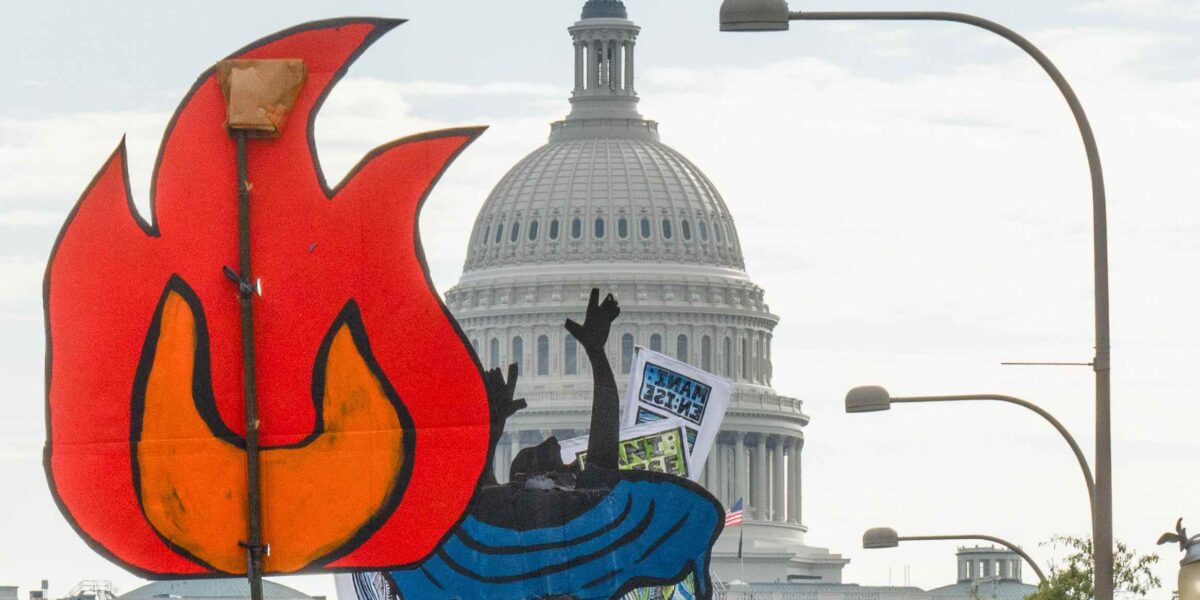Saying the U.S. election result is a blow to climate policy is a massive understatement. It could also spell trouble for the U.S. and global economies. Are there any flickers of hope?
After winning his first presidency in 2016, Donald Trump immediately committed to withdrawing from the international Paris climate agreement. His administration also rolled back more than 100 environmental rules, covering air and water pollution and emissions, drilling and extraction, wildlife protection and more. This time, the president-elect has vowed to reverse even more climate progress and “drill, baby, drill.”
From his statements, it’s clear the incoming president doesn’t understand climate or science and that he prioritizes coal, oil and gas billionaires over the people he was elected to represent.
There’s no doubt he could seriously hinder the already inadequate efforts to head off catastrophic global heating.
Climate isn’t the only thing he and his party seem determined to worsen. If he’s able to follow through on just some of his promises, life will get more difficult for women, people of colour, immigrants, working people, anyone who doesn’t identify as heterosexual, the global community and more.
Meanwhile, as countries gather for the United Nations Climate Change Conference of the Parties, COP29, in Baku, Azerbaijan, climate scientists say this year will be the hottest on record, igniting more costly extreme weather events, droughts, floods, heat domes, wildfires, intense storms, increased human migration, animal and plant extinctions, water shortages and potential changes to ocean and air currents.
It’s insane that so many people in power not only fail to heed the indisputable scientific evidence, but also ignore the proof staring them in the face. For decades, researchers from around the world — including those working for the fossil fuel industry — have been warning that we face an existential crisis like nothing humanity has ever seen. As predicted, the costly and visible consequences are growing by the day.
What hope is there?
Governments move slowly at the best of times, relying as they do on brief electoral cycles and short-sighted economic solutions. With constant electoral changes, it often seems we’re moving two steps forward, one step back — or worse, one step forward, two steps back.
We can’t ignore the role of governments, and many are working to resolve the climate crisis and other issues — although few treat it as the emergency it is. The current U.S. government has implemented many sound climate policies that also benefit the economy (while simultaneously ramping up fossil fuel production), as has Canada’s. But those are constantly under threat from state and provincial governments and opposition parties that seem more inclined to protect massive oil and gas industry profits than the citizenry they’re supposed to represent.
There’s reason for optimism, though. In the U.S., the clean energy boom has benefited those in “red” states even more than in “blue,” creating jobs and opportunities. Repealing some recent climate and clean energy policies could push US$80 billion of investment to countries such as China and cost the U.S. as much as $50 billion in lost exports, recent analysis shows. It will be tough to roll back policies that are helping so many people. Globally, the renewable energy boom is unstoppable.
Just as some provincial and state politicians are fighting against sensible, effective climate policies, others are implementing their own. California, which has the world’s fifth largest economy, representing 15 per cent of the U.S. economy, has vowed to continue efforts to protect people and the planet.
Renewable energy is booming even in oil-rich Texas, with a “70-fold increase in the amount of electricity it gets from the sun and a nearly 95-fold increase in battery capacity since 2014,” Environment Texas reports, adding, “Last year, wind and solar energy produced 31% of the state’s electricity” and it “has also seen a 40-fold increase in the number of registered electric vehicles.”
We can’t rely entirely on governments to get us out the mess we’ve created. It will be up to all of us to demand progress, to learn and create better awareness among ourselves, our friends, colleagues and families and those who aspire to represent us in government.
I’ll never give up and neither should you. The next few years may look grim, but that means our efforts are more important than ever.
David Suzuki is a scientist, broadcaster, author and co-founder of the David Suzuki Foundation. Written with David Suzuki Foundation Senior Writer and Editor Ian Hanington.
Learn more at davidsuzuki.org.



